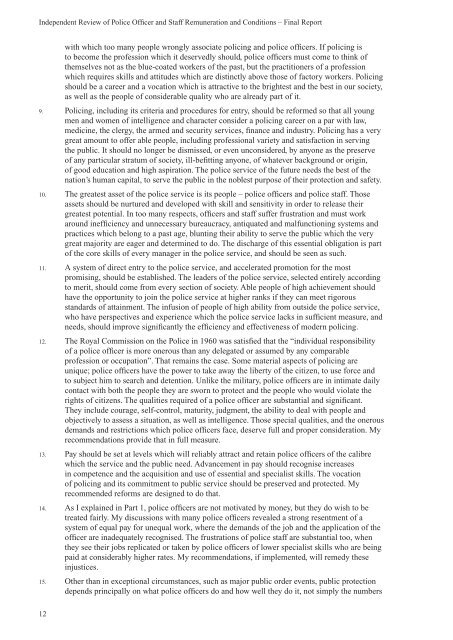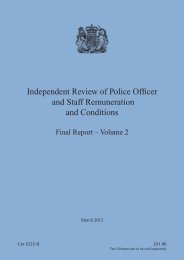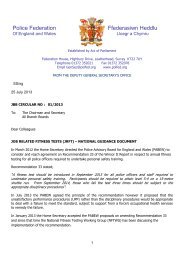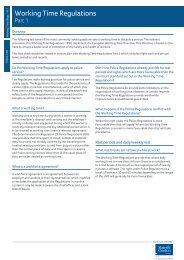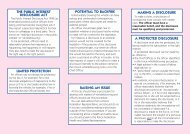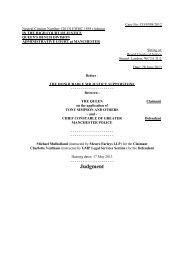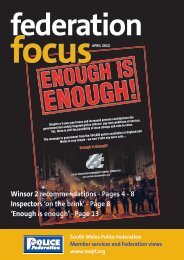Final Report - Volume 1 - the South Wales Police Federation
Final Report - Volume 1 - the South Wales Police Federation
Final Report - Volume 1 - the South Wales Police Federation
Create successful ePaper yourself
Turn your PDF publications into a flip-book with our unique Google optimized e-Paper software.
Independent Review of <strong>Police</strong> Officer and Staff Remuneration and Conditions – <strong>Final</strong> <strong>Report</strong>with which too many people wrongly associate policing and police officers. If policing isto become <strong>the</strong> profession which it deservedly should, police officers must come to think of<strong>the</strong>mselves not as <strong>the</strong> blue-coated workers of <strong>the</strong> past, but <strong>the</strong> practitioners of a professionwhich requires skills and attitudes which are distinctly above those of factory workers. Policingshould be a career and a vocation which is attractive to <strong>the</strong> brightest and <strong>the</strong> best in our society,as well as <strong>the</strong> people of considerable quality who are already part of it.9. Policing, including its criteria and procedures for entry, should be reformed so that all youngmen and women of intelligence and character consider a policing career on a par with law,medicine, <strong>the</strong> clergy, <strong>the</strong> armed and security services, finance and industry. Policing has a verygreat amount to offer able people, including professional variety and satisfaction in serving<strong>the</strong> public. It should no longer be dismissed, or even unconsidered, by anyone as <strong>the</strong> preserveof any particular stratum of society, ill-befitting anyone, of whatever background or origin,of good education and high aspiration. The police service of <strong>the</strong> future needs <strong>the</strong> best of <strong>the</strong>nation’s human capital, to serve <strong>the</strong> public in <strong>the</strong> noblest purpose of <strong>the</strong>ir protection and safety.10. The greatest asset of <strong>the</strong> police service is its people – police officers and police staff. Thoseassets should be nurtured and developed with skill and sensitivity in order to release <strong>the</strong>irgreatest potential. In too many respects, officers and staff suffer frustration and must workaround inefficiency and unnecessary bureaucracy, antiquated and malfunctioning systems andpractices which belong to a past age, blunting <strong>the</strong>ir ability to serve <strong>the</strong> public which <strong>the</strong> verygreat majority are eager and determined to do. The discharge of this essential obligation is partof <strong>the</strong> core skills of every manager in <strong>the</strong> police service, and should be seen as such.11. A system of direct entry to <strong>the</strong> police service, and accelerated promotion for <strong>the</strong> mostpromising, should be established. The leaders of <strong>the</strong> police service, selected entirely accordingto merit, should come from every section of society. Able people of high achievement shouldhave <strong>the</strong> opportunity to join <strong>the</strong> police service at higher ranks if <strong>the</strong>y can meet rigorousstandards of attainment. The infusion of people of high ability from outside <strong>the</strong> police service,who have perspectives and experience which <strong>the</strong> police service lacks in sufficient measure, andneeds, should improve significantly <strong>the</strong> efficiency and effectiveness of modern policing.12. The Royal Commission on <strong>the</strong> <strong>Police</strong> in 1960 was satisfied that <strong>the</strong> “individual responsibilityof a police officer is more onerous than any delegated or assumed by any comparableprofession or occupation”. That remains <strong>the</strong> case. Some material aspects of policing areunique; police officers have <strong>the</strong> power to take away <strong>the</strong> liberty of <strong>the</strong> citizen, to use force andto subject him to search and detention. Unlike <strong>the</strong> military, police officers are in intimate dailycontact with both <strong>the</strong> people <strong>the</strong>y are sworn to protect and <strong>the</strong> people who would violate <strong>the</strong>rights of citizens. The qualities required of a police officer are substantial and significant.They include courage, self-control, maturity, judgment, <strong>the</strong> ability to deal with people andobjectively to assess a situation, as well as intelligence. Those special qualities, and <strong>the</strong> onerousdemands and restrictions which police officers face, deserve full and proper consideration. Myrecommendations provide that in full measure.13. Pay should be set at levels which will reliably attract and retain police officers of <strong>the</strong> calibrewhich <strong>the</strong> service and <strong>the</strong> public need. Advancement in pay should recognise increasesin competence and <strong>the</strong> acquisition and use of essential and specialist skills. The vocationof policing and its commitment to public service should be preserved and protected. Myrecommended reforms are designed to do that.14. As I explained in Part 1, police officers are not motivated by money, but <strong>the</strong>y do wish to betreated fairly. My discussions with many police officers revealed a strong resentment of asystem of equal pay for unequal work, where <strong>the</strong> demands of <strong>the</strong> job and <strong>the</strong> application of <strong>the</strong>officer are inadequately recognised. The frustrations of police staff are substantial too, when<strong>the</strong>y see <strong>the</strong>ir jobs replicated or taken by police officers of lower specialist skills who are beingpaid at considerably higher rates. My recommendations, if implemented, will remedy <strong>the</strong>seinjustices.15. O<strong>the</strong>r than in exceptional circumstances, such as major public order events, public protectiondepends principally on what police officers do and how well <strong>the</strong>y do it, not simply <strong>the</strong> numbers12


